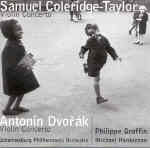Samuel Coleridge-Taylor produced his Violin Concerto in the year of his death, 1912, for the American violinist Maud Powell, who coincidentally gave the American premiere of Dvorák’s Violin Concerto. The connection doesn’t end there, however, as Ms. Powell thought it would be grand to have Coleridge-Taylor write a concerto based on Negro spirituals, much as Dvorák’s Ninth Symphony theoretically had been (now we know better, of course). What she got was what we might have expected from a British composer in 1912, something vaguely Scottish/Irish along the lines of Stanford–tuneful enough for sure, but no masterpiece. The first movement, despite the Allegro maestoso-Vivace tempo, has little sense for forward momentum, notwithstanding the evident craftsmanship of the writing for both soloist and orchestra. A lovely, sensitive Andante, along with a more sure-footed, dance-like finale make a far more positive impression, and it’s always nice to hear a neglected major work by a minor but obviously talented composer.
It says something about Coleridge-Taylor’s stylistic profile that the Dvorák concerto of more than three decades earlier actually sounds a touch more modern in style, or at least more focused in form and memorable in content. French violinist Philippe Graffin, who really digs in to both works, isn’t technically perfect. Every so often in the two finales he lands a bit sharp or flat, and he fudges a couple of really fast note clusters (or so it sounds)–but I really like his take-no-prisoners, gutsy approach. It has a lot in common with performances of the Romantic “Golden Age”, with some risk-taking tempos and plenty of freedom in phrasing and tone color. The central section of the Dvorák finale comes off especially well, truly sinister-sounding in a Gypsy sort of way, while the Andante of the Coleridge-Taylor has an unusually hushed beauty in Graffin’s hands. The Johannesburg orchestra also has its small rough edges, but it plays very well under Michael Hankinson, who gives his soloist a 100 percent effort. This is an enjoyable disc, well recorded and naturally balanced, with enterprising repertoire. Despite a few reservations, it’s certainly well worth hearing.
































